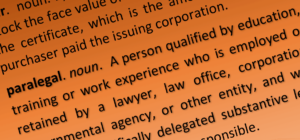 Thinking about working as a personal injury paralegal but wondering if it is a good fit for you? Here’s my perspective on what it takes to work in this area of law. I have worked for personal injury and wrongful death attorneys Rick Morefield and Andrew Speicher for the past twelve years, representing people in Kansas and Missouri who have been seriously injured, or have lost a loved one in an accident caused by someone else’s negligence.
Thinking about working as a personal injury paralegal but wondering if it is a good fit for you? Here’s my perspective on what it takes to work in this area of law. I have worked for personal injury and wrongful death attorneys Rick Morefield and Andrew Speicher for the past twelve years, representing people in Kansas and Missouri who have been seriously injured, or have lost a loved one in an accident caused by someone else’s negligence.
The day-to-day tasks involved in managing a personal injury or wrongful death case are similar to other practice areas; discover the facts, gather and analyze evidence, prepare summaries and exhibits, draft demands, pleadings, and discovery. If you have litigation experience in a different area of law, you won’t find transitioning to personal injury difficult from a task standpoint. It’s the “personal” in injury law you really need to consider in deciding whether you will enjoy this work, and in turn, add value to your client’s case.
Suffering serious injuries or losing a loved one in an accident changes your life. The people who come to my law firm to represent them need someone to listen when they talk about their pain, their financial struggles, or their loss. The attorneys, other paralegals, and I take as much time with our clients as needed to help them recover emotionally and financially. Getting to know my clients well helps not only the progression of their case, but often in their healing and recovery.
A client’s story and struggle can be heartbreaking, especially with traumatic brain injury or wrongful death claims. I don’t know how many times I have sat next to a client and felt like crying right along with them but I don’t, and you shouldn’t either. A personal injury paralegal needs to be compassionate but also needs to be able to compartmentalize in order to focus on what needs to be done to get just compensation for the client. Letting emotions overwhelm you can hamper that recovery.
Just as the client’s story can be difficult to hear, the documentary evidence needed to support a catastrophic injury or wrongful death claim can be difficult to see. Photographs depicting injuries, the accident scene, or worse are often graphic. This is another time when I have to set emotions aside and take a clinical approach to analyzing the evidence. I also have to be mindful about how the client might react in seeing the evidence. I can’t just thoughtlessly send it to the client in an email like I would do with a business litigation client.
A successful and rewarding career as a personal injury paralegal requires analytical, problem-solving, and time management skills. More importantly it requires a passion for helping people, a desire to develop personal connections to your clients, good listening skills, and a tough skin. If that describes you, maybe you found your calling.
